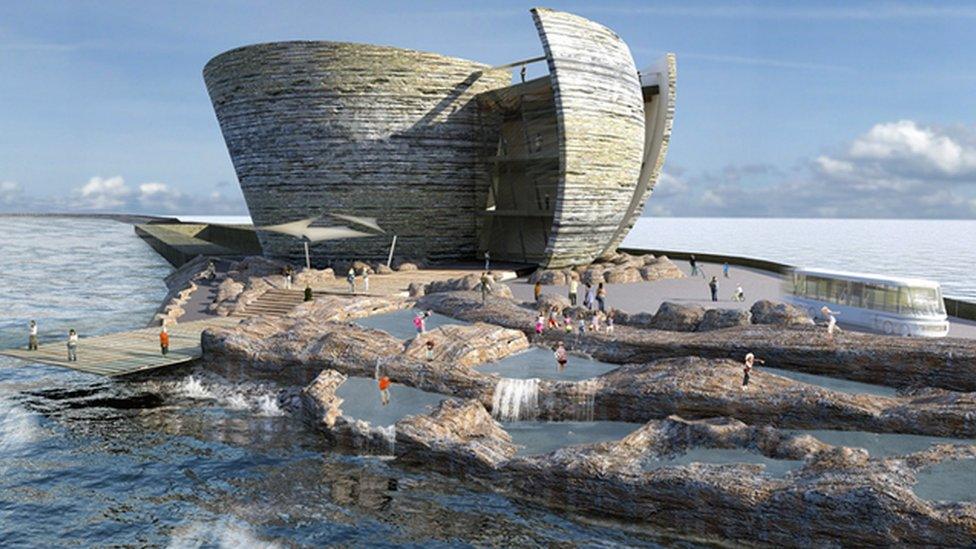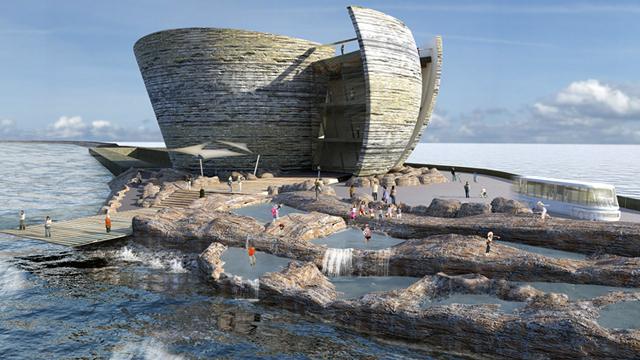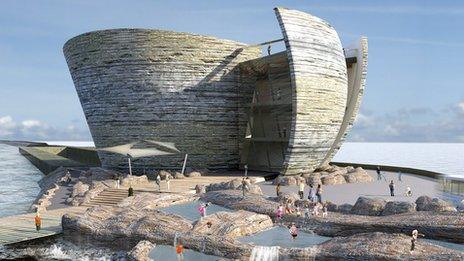£1bn tidal lagoon 'desperately needed', Edwina Hart says
- Published
BBC Wales environment correspondent Iolo ap Dafydd with the nuts and bolts of the tidal lagoon project - in 60 seconds
Agreement on the subsidy for the £1bn Swansea tidal lagoon project is "desperately needed", the Welsh Economy Minister has said.
Edwina Hart said without "certainty" on subsidy it was difficult for the project to attract investment.
The UK government said it was too early for the strike price to be agreed as it was carrying out checks on the project.
The firm behind the scheme has told BBC it would be "catastrophic" if the delayed project collapsed over funding.
Addressing AMs at a business committee meeting in Swansea, Mrs Hart said: "There is an elephant in the room.
"The tidal lagoon project, if they can't get certainty on strike price it's going to be very difficult for investment.
"We haven't got clarity on the UK government's energy policies which makes it very difficult for the sector and we can't afford to have that.
"I know the strike price is absolutely mouth-watering compared to nuclear at Hinkley but we have to do something about it.
"We desperately need that strike price.
"I've engaged with the UK government on this and had regular discussions with [Wales Office Minister] Lord Bourne, and will be continuing to press this issue on behalf of the tidal lagoon."

Ioan Jenkins, Tidal Lagoon Power (TLP) development director, said the company "have to be confident" the UK government will pay the subsidy they want for power generated by the lagoon, but he would not reveal the figure.
TLP is asking for a higher subsidy than wind turbines, solar power and nuclear.
"The challenge for everybody is it's the first of its kind in the world," Mr Jenkins told BBC Wales.
"We've been working on this project for the last four years.
"We know 86% of people here are in favour. We have to be confident. We are ready."
He added: "It's in the hands of the politicians. Without that, we wouldn't be able to deliver the project. At this point we can't say any more than that.
"Is there a possibility it wouldn't happen? Of course there is, but we're doing everything we can."
'No timeframe'
A Department of Energy and Climate Change spokesman said: "Tidal Lagoon Power are seeking a significant amount of financial support from consumers for their proposed project in Swansea Bay and we need to carefully consider whether it is in the best interest of bill payers.
"At present there is no timeframe for how long the negotiation process for Swansea Bay tidal lagoon may take.
"It depends on a number of factors, many of which are outside the control of the government."

The tidal lagoon on the eastern side of Swansea Bay, between the docks and the new university campus, would use the flow and ebb of the tide to generate energy, which would then be converted into electricity.
Thousands of construction and manufacturing jobs could be created.
TLP also needs to gain a marine licence from Natural Resources Wales but Mr Jenkins said this is expected to be granted "in the next few weeks".
TLP received backing by the DECC, external in June but the start date for work has been pushed back to 2017 as negotiations of subsidy continue.
Earlier this month, the Welsh government accused the UK government of "dithering over funding".

How would the lagoon work?
Watch Tidal Lagoon Power's video of how the turbines would work
A six-mile long seawall loops two miles (3.2 km) out to sea from close to the mouth of the River Tawe and Swansea Docks and makes landfall close to Swansea University's new Fabian Way campus to the east.
It would house 16 underwater turbines generating electricity on both the rising and falling tide.
Enough renewable power would be produced for 155,000 homes (equivalent to 90% of Swansea Bay's annual domestic electricity use) for 120 years.
Source: Tidal Lagoon Power Ltd
- Published2 October 2015

- Published18 March 2015

- Published7 February 2014
